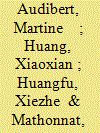|
|
|
Sort Order |
|
|
|
Items / Page
|
|
|
|
|
|
|
| Srl | Item |
| 1 |
ID:
124565


|
|
|
|
|
| Publication |
2013.
|
| Summary/Abstract |
In the rural health-care organization of China, township hospitals ensure the delivery of medical services above village health stations and below county hospitals. Particularly damaged by the economic reforms implemented from 1975 to the end of the 1990s, the efficiency of township hospitals has been questioned, mainly because of the implementation since 2003 of the reform of health insurance in rural areas (New Rural Cooperative Medical Scheme). From a database of 24 randomly selected township hospitals observed over the period 2000-2008 in Weifang Prefecture (Shandong), this study examines the efficiency of township hospitals through a two-stage approach. As curative and preventive medical services delivered at township hospital level use different production processes, two data envelopment analysis models are estimated with different orientations to compute scores. The results show that technical efficiency has declined over time. The factors explaining technical efficiency are mainly environmental characteristics rather than internal ones. Among these environmental factors, NRCMS have in average a negative effect on the evolution of THs efficiency, although efficiency have improved for some of them. Our results suggest also that, in the context of China, the efficiency of township hospitals is influenced by unobservable factors. From our findings, we suggest five main orientations to improve THs efficiency.
|
|
|
|
|
|
|
|
|
|
|
|
|
|
|
|
| 2 |
ID:
151562


|
|
|
|
|
| Summary/Abstract |
Since the early 2000s, the Chinese government has undertaken a series of reforms in the health sector. Among these, the three most important have been concerned with medical insurance, hospital administration, and pharmaceutical policies. The aims of these reforms were to extend health insurance coverage, to increase the activities and the efficiency of the health establishments, and to improve patient care. This article focuses on two components of these reforms: the development of health insurance in rural areas and the policy on essential medicines in conjunction with hospital reforms. Our longstanding co-operation with a research team from Weifang University and with the Weifang Health Bureau allowed us to follow these reforms and collect data (primary source) from a sample of township hospitals from Weifang Prefecture. Those data allowed us to study their effects on health facilities' level of activity and efficiency. This article provides an overview of studies we carried out on these issues over the period from 2000 to 2012. Our analyses were mainly based on non-parametric models (Data Envelopment Analysis, Malmquist Index, and partial frontiers) and impact analyses, coupled with interviews with hospital staff and medical authorities. Results show that the development of health insurance in rural areas had a positive effect in greatly increasing the activities of the hospitals covered by our study. On the other hand, it did not have a positive influence on their efficiency, which declined in the period concerned. This result is to be explained by the fact that, even though staff activity increased, it remained low, since the observed increase in activity was not sufficient to make up for the parallel increase in staff numbers. Similarly, reforms in the hospital and pharmaceutical sectors had no effect on the township hospitals of our survey. In fact, in order to compensate for the observed reduction of hospital resources following the introduction of the reforms, on the one hand the government increased the subsidies allocated to township hospitals, and on the other hand the hospitals strongly innovated in sophisticated and expensive care, to the benefit of a relatively small number of patients. Therefore, there were some very positive steps forward, but they still call for a more nuanced assessment of the effects of the reforms.
|
|
|
|
|
|
|
|
|
|
|
|
|
|
|
|
|
|
|
|
|